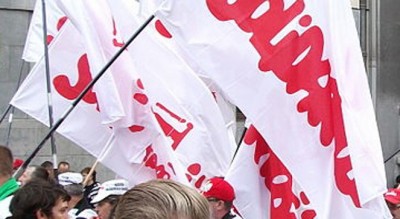I met repeatedly with the opinion that people born or growing up after ’89 usually underestimate the benefits of the transformation. We got used to the fact that the store shelves are full, elections regular and fair and the borders open. This does not, however, mean that we no longer appreciate the achievements of the previous generation. It simply means that we want to move forward.
We were born in a democratic state: we form associations, sign petitions criticizing the authorities, participate in manifestations without any legal repercussions. We are not familiar with a “different”reality. But can we say that recognizing those basic rights and freedom as something normal is a bad thing? Can we say that it – as suggested by some critics of the younger generation – demonstrates a lack of respect for the achievements of all those involved in opposition activities in the communist period?
It is natural for the generation of Solidarity to assess the achievements of the political transformation unlike the current generation of 20- and 30-year-olds. In our opinion, free state is a given given and we want to work on its further improvement. The generation of our parents still remembers the gray communist regime and often urges us to enjoy what we already have
In addition to the differences in outlook, there is one more important difference between the generations. It concerns heroines and heroes of the Round Table who for 25 years have been holding power in our country. Parties change their names, politicians switch parties but people remain the same. Stability and continuity in politics is not in itself a bad thing. The problem arises when the authorities deem the change unnecessary what is considered by a significant part of the population to be essential.
Confidence that my e-mails and text messages are being read only by their recipient, the possibility of creating relationships without environmental pressure, the right to free expression of our own identity – those are just a few examples that for a large part of the society constitute the basis of a truly free country. Unfortunately, usually divided political scene, in these cases often speaks with one voice, recognizing them as the whims of youth which does not appreciate the scale of changes that occurred in Poland after 1989. For some politicians, such as “hot water at the tap” has become synonymous with prosperity, so “passport in the drawer” is treated as a determinant of freedom.
Therefore we are faced with the conflict of attributes of intergenerational conflict. Since it is not so intense, it is a very good starting point for a social change, especially a change in the normative system of society. However, such a change will not occur on its own. Moreover, it will not be carried out be the generation of Solidarity, because they have already left the frontier of freedom and a significant part of them is actually happy with current order. So we have to be proactive.
Questioning the achievements of the generation of Solidarity, while passively observing the fight for the realization of their demands, makes us look like spoiled children of wealthy parents – supposedly happy with a gifted apartment but at the same time complaining about its location or layout. From previous generations we have inherited democratic state with all the tools that allow us to influence the direction of its development – how we use it depends only on our will and determination. The memory of the important historical events should also encourage reflection on where we want to be in a few decades.
This year is packed with anniversaries important for Poland. One of them is the 25th anniversary of the democratic changes, the highpoint of which were probably the first partially free parliamentary elections on June, 4 1989 . For a quarter of a century we have lived in a free and democratic country and this is an excellent opportunity to reflect on how we want to use this freedom. Regardless the state’s official celebrations, we should set up a truly civic celebration of the 25th anniversary. It also depends on us whether it will be an another “academy in honor of” or a moment of reflection on what country is the Poles’ in 2014 .
Let it be a year of stormy discussions, debates and constructive disputes. Let’s think about where are current limits of freedom and in which direction we want to move. The space for such activity is the initiative Razem (Together ’ 89) – a coalition of NGOs which celebrate 25th anniversary by organizing conferences, debates, art events and educational projects devoted to transformation.


















No comments
Be the first one to leave a comment.